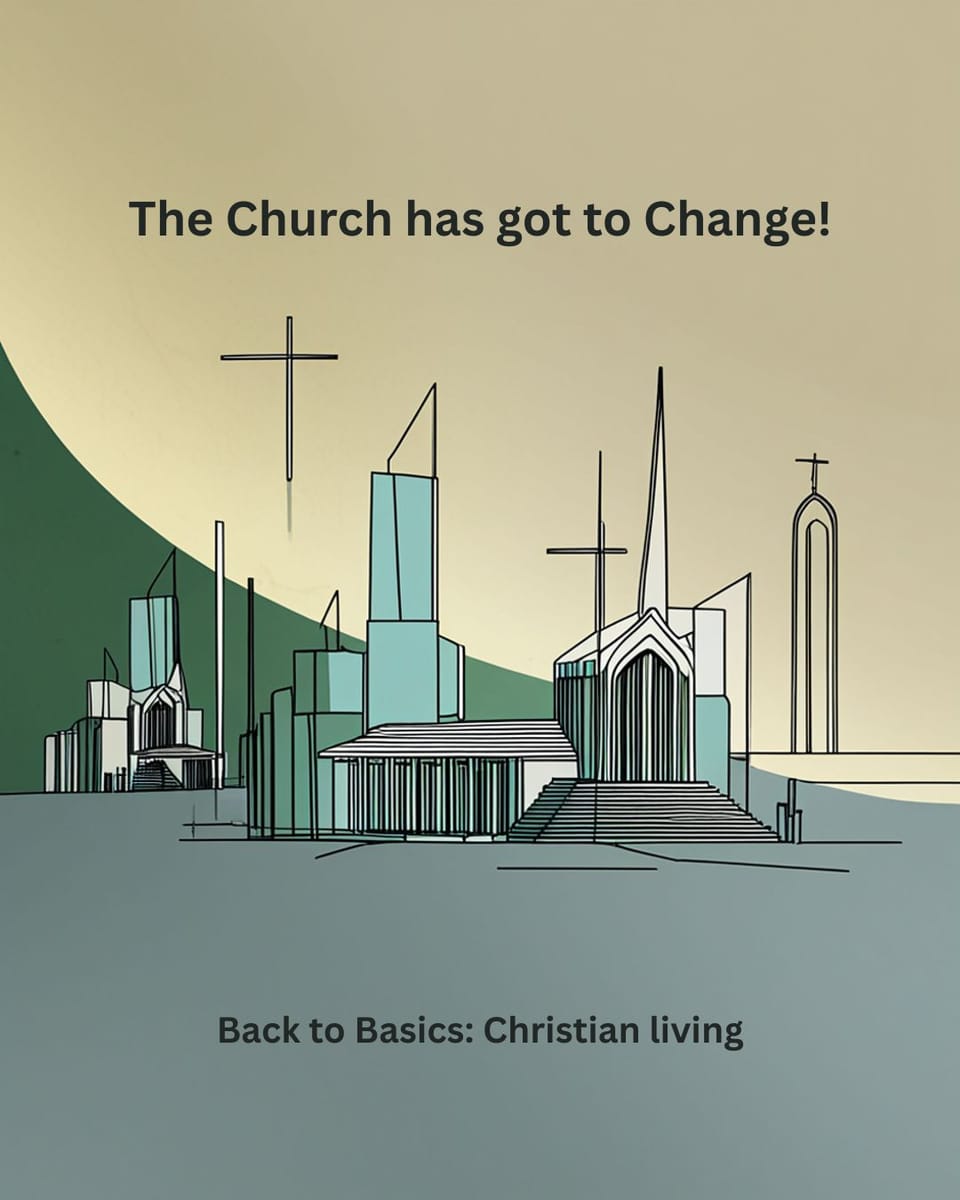The Church has got to Change!

A Biblical Mandate for Change
The Church has got to change! This isn't a revolutionary statement; it's a necessary acknowledgement of where we are and where we need to be. In an ever-evolving world, the Church must remain steadfast in its message while adapting its methods to effectively reach those searching for truth.
Throughout Scripture, we see that God's truth remains constant, but His methods of reaching people adapt to their circumstances. The Lord Jesus Himself taught differently to different audiences—parables for the multitudes, direct teaching for His disciples. The Apostle Paul became "all things to all men" that he might "by all means save some" (1 Corinthians 9:22 KJV).
But what must change in today's Church?
From Institution to Movement
The early Church wasn't an institution with buildings and programmes; it was a dynamic movement of passionate followers. The Book of Acts shows believers who were so transformed by their encounter with Christ that they couldn't help but share it.
"And they, continuing daily with one accord in the temple, and breaking bread from house to house, did eat their meat with gladness and singleness of heart, Praising God, and having favour with all the people. And the Lord added to the church daily such as should be saved." (Acts 2:46-47 KJV)
Today's Church must recapture this movement mentality—less focused on maintaining institutions and more on mobilising disciples.
From Attendance to Discipleship
Jesus never commissioned us to build attendance; He commanded us to "go ye therefore, and teach all nations, baptizing them in the name of the Father, and of the Son, and of the Holy Ghost: Teaching them to observe all things whatsoever I have commanded you" (Matthew 28:19-20 KJV).
Churches that focus merely on Sunday attendance without intentional discipleship processes are failing their biblical mandate. True growth isn't measured by how many come through our doors but by how many go out changed and equipped to change others.
When we prioritise attendance over discipleship, we create religious consumers rather than committed followers. The only way people will truly remain in church is if they're growing as disciples, finding purpose in God's kingdom, and experiencing the transformative power of community.
From Preaching Only to Equipping All
For too long, ministry has been viewed as the responsibility of professional clergy. Yet Scripture paints a different picture:
"And he gave some, apostles; and some, prophets; and some, evangelists; and some, pastors and teachers; For the perfecting of the saints, for the work of the ministry, for the edifying of the body of Christ." (Ephesians 4:11-12 KJV)
Notice the flow: leaders equip the saints (all believers), who then do the work of ministry. Churches must shift from clergy-centred ministry to equipping all believers to minister according to their gifts.
From Isolation to Community
In an age of digital connection but profound loneliness, the Church must provide authentic community. The biblical pattern was never individual Christianity but believers in meaningful relationship:
"And they continued stedfastly in the apostles' doctrine and fellowship, and in breaking of bread, and in prayers." (Acts 2:42 KJV)
Small groups, mentoring relationships, and intentional community aren't optional extras but essential expressions of biblical faith. When people experience genuine belonging, they're far more likely to remain connected to the body of Christ.
From Cultural Retreat to Cultural Engagement
Jesus called us to be "in the world, but not of the world" (John 17:14-16 KJV). Too often, churches have either fully embraced culture (losing distinctiveness) or fully retreated from it (losing relevance).
Like Daniel in Babylon, we're called to engage culture without compromising conviction. The Church must learn to speak the language of the culture while remaining faithful to the timeless message of Scripture.
"Let your light so shine before men, that they may see your good works, and glorify your Father which is in heaven." (Matthew 5:16 KJV)
From Programme-Driven to Purpose-Driven
Many churches have become enslaved to their programmes, existing to perpetuate activities rather than fulfil purpose. The Church exists to glorify God by making disciples who make disciples.
Every activity, every programme, every resource should be evaluated by this standard: Does it effectively contribute to making disciples? Is it aligned with the Great Commission?
"But seek ye first the kingdom of God, and his righteousness; and all these things shall be added unto you." (Matthew 6:33 KJV)
From Comfort to Mission
Perhaps the most significant change needed is from comfort-seeking to mission-embracing. The Church wasn't designed to be a spiritual spa where Christians come to feel better about themselves, but a training ground for kingdom advancement.
"Go ye into all the world and preach the gospel to every creature." (Mark 16:15 KJV)
Churches that challenge their members to sacrificial mission—both locally and globally—tend to grow spiritually vibrant communities. Comfort-focused churches eventually decline as they lose sight of their purpose.
From Rigid Tradition to Biblical Innovation
Traditions can be beautiful when they point us to timeless truths, but problematic when they become ends in themselves. The Pharisees were condemned not for having traditions but for elevating them above God's commands (Mark 7:8-9 KJV).
Churches must distinguish between unchanging biblical principles and changeable methods. Methods can and should adapt to effectively reach each generation while the message remains unchanged.
"But the word of the Lord endureth forever. And this is the word which by the gospel is preached unto you." (1 Peter 1:25 KJV)
The Path Forward
The changes needed in today's Church aren't about chasing cultural relevance or abandoning biblical truth. Rather, they're about recalibrating to the biblical vision of what the Church should be—a dynamic, disciple-making movement that transforms lives and communities.
Churches that embrace these changes will find themselves not just surviving but thriving in the years ahead. Those that cling to institutional preservation at the expense of mission will continue to decline.
As we consider these necessary changes, let us remember the Lord's words to the church at Ephesus: "Remember therefore from whence thou art fallen, and repent, and do the first works" (Revelation 2:5 KJV).
The future of the Church doesn't depend on better programmes, cooler technology, or more dynamic personalities. It depends on our willingness to return to our first love and first mission—following Jesus wholeheartedly and making disciples who do the same.
That is how the Church must change! That is how people will not only come to church but stay and grow in authentic discipleship…
Key Takeaways:
- The Church must recover a movement mindset, not just maintain an institution.
- Shift from counting attendance to cultivating disciples who make disciples.
- Leaders equip all believers for ministry; ministry is not just for clergy.
- Prioritise authentic, Acts‑2 community over isolated Christianity.
- Engage culture without compromise; keep distinction and relevance.
- Evaluate programmes by purpose: do they make disciples?
- Trade comfort for mission and obedience to the Great Commission.
- Methods may change; the message of Scripture does not.





